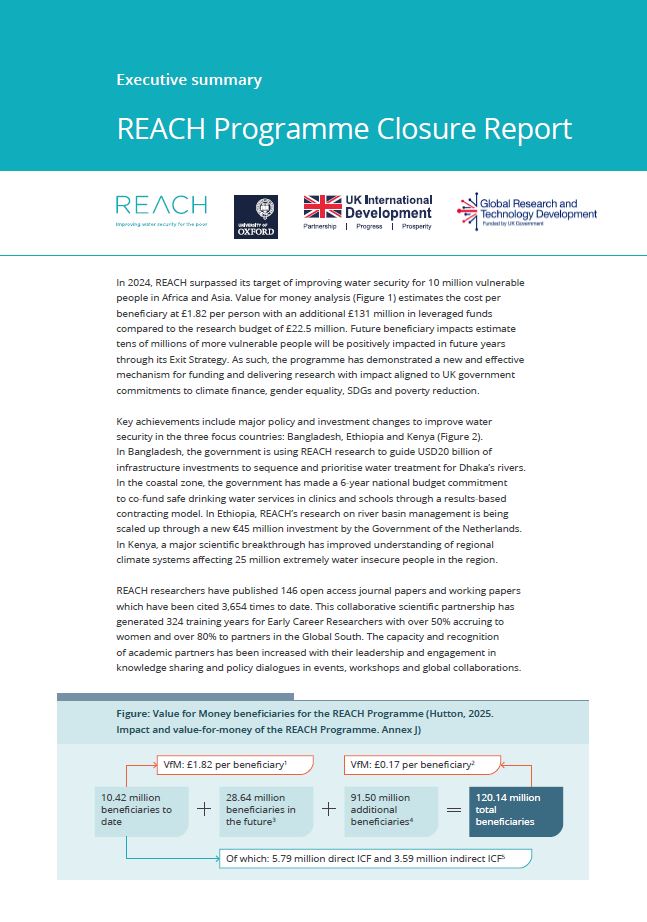In 2024, REACH surpassed its target of improving water security for 10 million vulnerable people in Africa and Asia. Value for money analysis estimates the cost per beneficiary at £1.82 per person with an additional £131 million in leveraged funds compared to the research budget of £22.5 million. Future beneficiary impacts estimate tens of millions of more vulnerable people will be positively impacted in future years through its Exit Strategy. As such, the programme has demonstrated a new and effective mechanism for funding and delivering research with impact aligned to UK government commitments to climate finance, gender equality, SDGs and poverty reduction.
Key achievements include major policy and investment changes to improve water security in the three focus countries: Bangladesh, Ethiopia and Kenya. In Bangladesh, the government is using REACH research to guide USD20 billion of infrastructure investments to sequence and prioritise water treatment for Dhaka’s rivers. In the coastal zone, the government has made a 6-year national budget commitment to co-fund safe drinking water services in clinics and schools through a results-based contracting model. In Ethiopia, REACH’s research on river basin management is being scaled up through a new €45 million investment by the Government of the Netherlands. In Kenya, a major scientific breakthrough has improved understanding of regional climate systems affecting 25 million extremely water insecure people in the region.
REACH researchers have published 146 open access journal papers and working papers which have been cited 3,654 times to date. This collaborative scientific partnership has generated 324 training years for Early Career Researchers with over 50% accruing to women and over 80% to partners in the Global South. The capacity and recognition of academic partners has been increased with their leadership and engagement in knowledge sharing and policy dialogues in events, workshops and global collaborations.
Key lessons from the programme identify a) the critical role of building and sustaining effective government partnerships, b) the value of long term and interdisciplinary Observatories to design, test and scale water security interventions, c) an unwavering focus on aligning high quality research with impact for the most vulnerable, d) the importance of a clear and ambitious project goal backed up by resources over the long term, and e) the need to have a strong gender strategy to support all aspects of programme delivery.
We identify five recommendations for research with scalable impact in the Global South: a) a ten-year time horizon is a realistic period to deliver such ambitious impact targets, b) Observatories provide governments and partners with concrete evidence of how impacts can be generated and then scaled, c) FCDO country offices could amplify impacts and value-for-money if aligned with programme goals, d) gender equality in research and practice is extremely challenging requiring protected resources and supported strategies to influence donor and government behaviours, and, e) an Exit Strategy provides a framework to support a transition to sustain, scale up and scale out impacts in current and new geographies.

